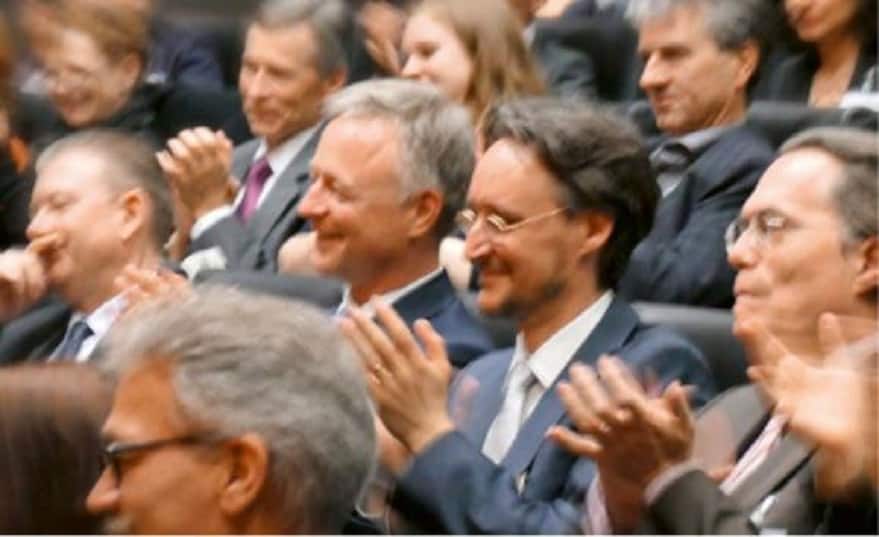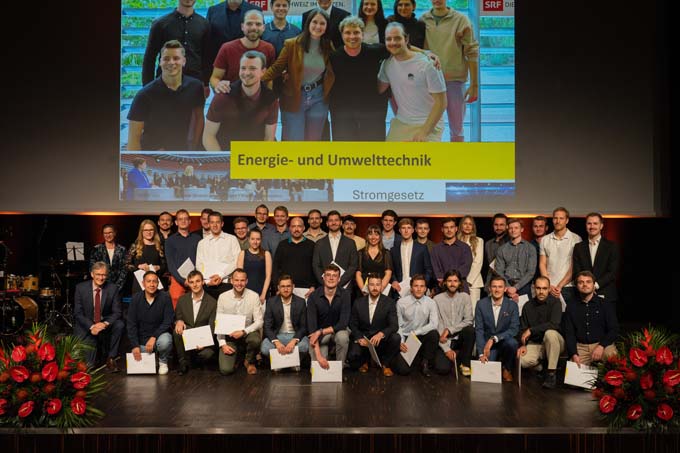Swiss Ethics Award 2018" ceremony
With regard to the presentation of the "Swiss Ethics Award 2018", the organisers are once again convinced: lived values and sustainable strategies improve not only one's own corporate sphere, but the world. Below are portraits of the four nominated companies that will be honoured for their achievements on 26 April 2018 in Lucerne.

Is it worth taking on responsibility? It pays off on a number of levels, especially when you are rewarded for sustainable activities and social achievements. For more than a decade, the Swiss Excellence Forum has been dealing with important ethical aspects in business. The "Swiss Ethics Award" is recognition for ethical performance in the Swiss economy. The award honors the achievements of organizations and companies that demonstrate a special commitment to sustainable corporate governance and responsibility.
On 26 April 2018, the Swiss Ethics Award will be presented for the eighth time at the Ethical Leadership Conference in the KKL Lucerne. Four projects have been nominated for the Swiss Ethics Award 2018:
Coop and Chocolats Halba
(Partnership project: Sustainable chocolate from Ecuador)
The Coop Group can look back on a history of over 150 years. The now internationally active retail and wholesale company employs over 85,000 people. Chocolats Halba, on the other hand, is a Swiss premium manufacturer of chocolate specialities for trade and industry. Chocolats Halba is a Coop division. Both companies have anchored sustainability in their daily work and consider this commitment to be an important basis for the long-term success of the company. The partner project submitted takes into account cocoa production in Ecuador. It concerns the existence of the noble cocoa variety "Cacao Nacional Arriba", whose planting and cultivation has increasingly been displaced by an apparently more robust high-yield variety (keyword: monoculture).
In the long term, this could have led to serious ecological factors such as the increase in pests. To counteract this, Cho colats Halba, in collaboration with the Coop Fund for Sustainability, is training up to 20 cocoa farmers to become so-called agroforestry trainers - with the aim of being able to pass on a lot of useful knowledge about chocolate.
Instead of investing only in monocultures, cocoa is cultivated together with other crops and precious woods (keyword: biodiversity). This makes a significant contribution to improving the landscape and minimizing crop failures, as well as to food security and increasing the income of the small cocoa farmers who have settled in the area.
IKEA
(IKEA Switzerland Refugee Inclusion Programme)
IKEA, the multinational furniture and interior design group, was founded in Sweden in 1943 by Ing var Kamprad. One of the first IKEA furniture stores was opened in Switzerland. Today, IKEA Switzerland has nine stores and employs more than 2700 people from a total of 94 nations.
IKEA's core corporate value is community. At this level, the company is committed to a continuous and consistent commitment to diversity and inclusion.
The Refugee Inclusion Programme is a result of this commitment. The integration of refugees is one of the major challenges facing society. Many refugees are unemployed, dependent on the state and poorly integrated into society. In its project, IKEA Switzerland provides six-month internships for two refugees in each of its furniture stores.
To support the integration process, the internship is accompanied by intercultural training. This gives recognised and provisionally admitted refugees an insight into the Swiss labour market and working culture, enables them to gain initial work experience and develop language skills. This improves their chances on the labour market and encourages them to apply for jobs. The current project runs for a period of three years.
Swisscom Ltd
("Together for more sustainability")
Swisscom, the well-known telecommunications and IT company, has over 20,000 employees. Swisscom AG develops, produces and markets network infrastructures and the services based on them in areas such as telecommunications, information technology, broadcasting, media and entertainment. Outside Switzerland, Swisscom is mainly present in Italy. Digitisation is currently changing society and the economy. This brings with it many opportunities as well as challenges.
The handling of data and media, changed working conditions, mobile forms of work and energy efficiency are all part of this. Swisscom has included these topics in its sustainability strategy and has set itself specific goals for 2020.
For example, against the backdrop of responsible use of digital media, over 30,000 pupils, parents and teachers are taught each year with the aim of developing digital skills and know-how. With its "Work Smart Initiative", for example, Swisscom is committed to mobile forms of work.
Supported by international partnerships, Swisscom is committed to fair supply chains (e.g. health protection, etc.). To date, improvements have been agreed and demanded for over 750,000 workplaces. Finally, Swisscom has committed itself to increasing energy efficiency by a further 35 percent by 2020 in the area of climate protection.
Clinica Luganese Moncucco
(Submitted project: IntegraTI)
The Clinica Luganese Moncucco was founded in 1900 by the Congregation of the Sisters of Charity of Como. The aim was to provide care for the sick and needy. The Clinica has continued to develop and is today one of the most important nursing homes in the Canton of Ticino. At the end of 2015, after more than a century, the Clinica was taken over by two Swiss foundations. Due to the current refugee situation, Ticino was confronted with a high number of border entries. There are currently around 1300 refugees or foreigners who have been admitted beforehand living in Ticino. Of these, unfortunately, less than 20 percent have employment.
The consequences of exclusion from the world of work are dependence on the welfare state, a lack of integration and, as a result, increased tensions in society. With the "IntegraTI" project launched in 2016, Clinica Luganese Moncucco aims to enable 25 refugees to integrate into the world of work by 2020.
They are offered an internship, the promotion of language skills and vocational training or retraining in the healthcare sector or hotel industry. By gaining access to the Swiss labour market, refugees gain material independence, improved opportunities for social integration and can make a contribution to the healthcare sector when they return to their home country.









